|
One of the most difficult aspects of creating this deck is that Alice really has so many difficult and strange adventures but very few happy ones. This made designing some of the pleasant cards more challenging, including this one. But the ending of Wonderland, when Alice wakes all cozy and safe at home does quite nicely, don't you think?
10 of Pentacles
Through the Looking Glass In the text, Alice’s sister is mentioned, but not any other family specifically. Instead, Dinah, Snowball, and Kitty are her closest companions from this world that show up in the stories. In Wonderland, Alice’s sister imagines what waking world sounds inspired Alice’s dream. In Looking Glass, Alice does her own analysis, perhaps showing that she is indeed growing up and becoming more self-reflective. Alice talks to the kittens as if they are people, trying to find answers to some of the questions that plague her. “‘Now, Kitty, let’s consider who it was that dreamed it all. This is a serious question, my dear, and you should not go on licking your paw like that—as if Dinah hadn’t washed this morning!. You see, Kitty, it must have been either me or the Red King. He was part of my dream, of course—but then I was part of his dream, too! Was it the Red King, Kitty? You were his wife, my dear, so you ought to know—Oh, Kitty, do help to settle it! I’m sure your paw can wait!’ But the provoking kitten only began on the other paw, and pretended it hadn’t heard the question.” No matter how many unanswered questions Alice has and no matter how often the cats will not do as she asks, Alice is safe, comfortable, and loved in the drawing room by the fire. Down the Rabbit Hole In a reading, this card shows the gifts of a stable and loving family, the value of legacy, and the comfort of tradition. While we know all too well that family often brings obligations and dysfunctions that we’d rather do without, we also know that our ancestors and our current families also benefit us. This card reminds you to value those benefits, to honor them within your own life. Throughout this suit we’ve seen out the material and spiritual worlds are bound together. This is true here, too. Material and spiritual stability and life are important gifts that family members give each other. If this is not true in your life, this card asks you to change that. Keywords: stable family, security, wealth, abundance, comfort, roots, plans for the future, connection, balanced and happy life To pre-order through Amazon, click the picture below!
0 Comments
This is one of the first images Eugene created for this deck and I just love the perspective. While we all love Pixie's compositions in the RWS deck, changing the angle of a scene can make a static moment more dynamic. Plus, the Hanged Man does remind us of the importance of seeing things from different points of view.
7 of Wands
Through the Looking Glass During the trial of the Knave of Hearts, Alice is ordered to leave the courtroom because, according to Rule 42, newly penned by the King, “all persons more than a mile high to leave the court.” Alice stands up for herself, claiming she is not a mile high. A short time later, she proclaims, “Stuff and nonsense!...The idea of having the sentences first!” when the Queen insists that sentences come before verdicts. The Queen orders Alice to be beheaded and for the first time when so ordered, nobody moves. “‘Who cares for you?’ said Alice (she had grown to her full size by this time). ‘You are nothing but a pack of cards!’” “At this the whole pack rose up into the air, and came flying down upon her…and [she] tried to beat them off….” Alice wasn’t afraid because she was filled with the strength of her convictions. She knew she was right and wasn’t going to be cowed by a ruthless Queen and ineffectual King. Once she realized her own power, she was able to face those who had become her enemies. In the text, this is when she wakes from her dream. If, as many believe, this story is about growing up, Alice has reached a stage of maturity where she knows right from wrong and knows that she must defend her values. Down the Rabbit Hole In a reading, this card describes a situation where you must take a stand against what feels like incredible odds. As the chaos swirls around, you keep your balance and your head by keeping true to your ideals and fighting for what is right. Just as Alice wakes before we learn the outcome of her fight, this card does not guarantee victory. The important thing is to defend the truth as you see it. That matters more than winning. Hold tight to your convictions and tap into your deepest reserves of courage and face all comers with integrity. Keywords: defending, protecting, valor, courage, standing up for beliefs, bravery, resolve, taking action To pre-order through Amazon, click the picture below!
It is common to use "happy" or "positive" cards in blogs, especially when they are trying to promote the deck. But to be honest, I find the ones that portray those harder moments of human life to be more poignant and interesting. This is one of those cards.
4 of Cups
Through the Looking Glass The Mock Turtle is one of the saddest creatures in the text. “…Alice could hear him sighing as if his heart would break. She pitied him deeply. ‘What is his sorrow?’ she asked the Gryphon. And the Gryphon answered, very nearly in the same words as before, ‘It’s all his fancy, that: he hasn’t got no sorrow, you know…’” We never really know why he is so sad, except that he used to be a real turtle. We don’t know how or why he became a Mock Turtle. This chapter, in fact, leaves a lot of questions unanswered and many Carroll lovers dissatisfied. Many who’ve analyzed the story say that this part lacks the richness of the rest of the story. It is entertaining and clever, but it’s all sizzle and no steak. Which makes the Mock Turtle an even more appropriate choice for this card. If grief or heartbreak are not processed, they become a pointless cycle, leading nowhere. There is no transformation or redemption. Even the fishes in Wonderland value having a purpose. “‘They were obliged to have him [the porpoise] with them,’ the Mock Turtle said, ‘No wise fish would go anywhere without a porpoise.’” In this card, the Mock Turtle has forgotten his own wise advice, as we often do when we are in the depths of despair. Down the Rabbit Hole In a reading, this card shows someone who is unhappy, disengaged, and lackadaisical. This is not a card of mourning nor of heartbreak, although either of those emotions could have been the starting point. When we hold our emotions tightly, rather than letting them flow to be experienced and processed, they stagnate. Like the Mock Turtle, you’ve dwelt too long in the past. You’ve held on too long to some slight or some disappointment, and now it has transformed and filled your heart and mind with ennui. You are dissatisfied with what you have. You cannot see any fresh possibilities even though they are right under your nose. The card does not indicate whether you shake this off or keep stewing, so it is completely your choice. Keywords: discontent, dissatisfaction, ennui, boredom, lack of gratitude, depression, resisting change, stagnation, lack of inspiration To pre-order from Amazon, click to picture below!
This card worked out so nicely. It includes elements from a scene in the text (I use "text" to refer to the combined works, both Alice in Wonderland and Through the Looking Glass) that fits in really nicely with the traditional RWS composition.
2 of Swords
Through the Looking Glass “‘In that direction,’ the Cat said, waving its right paw round, ‘lives a Hatter: and in that direction,’ waving the other paw, ‘lives a March Hare. Visit either you like: they’re both mad.’” This is the Cheshire Cat’s advice to Alice when she asks for directions. She isn’t sure where she wants to go, “as long as I get somewhere,” she says. With this information, she weighs her options. She’s seen a hatter before, so that choice is less interesting. Since the month is May, perhaps the Hare won’t be “so mad as it was in March.” As she approaches the Hare’s house, she second guesses her choice, “Suppose it should be raving mad after all! I almost wish I’d gone to see the Hatter instead!” As it turns out, the Hatter was at the Hare’s and they are both behaving pretty madly. All Alice can do is make the best of it, try to get out of the situation unscathed, and learn whatever lessons she can. In the end, we are all glad she made the decision she did because the Mad Tea Party is one of the most well-known chapters from Wonderland. Down the Rabbit Hole In a reading, this card shows a situation where a decision must be made, and it also gives advice about how to make that decision. In many cases, tarot suggests listening to our intuition and values what we think of as “other ways of knowing.” However, the suit of Swords is about logic and reason. Alice sits with her back toward the ocean and the moon, both symbols of the subconscious and intuition. She is blindfolded so that she doesn’t look for more input. She is alone with what she already knows and using that information must make her choice. You already have all the facts that you need. Use your reason, weigh the pros and cons, and make your decision. Waiting for more input is just a way to procrastinate. Neither choice may be optimal and putting off the decision will not change that. Keywords: needing to make a decision, insufficient data, lack of facts, denial, feeling conflicted, head and heart in opposition To pre-order from Amazon, click the picture below!
Another of my favorite cards from this deck is the Queen of Pentacles. I was always so intrigued by the Sheep's shop, and as a knitter and someone who thinks sheep are wonderful, and as a fellow Pentacles creature myself, it would be hard for me not to love this card.
Queen of Pentacles
Through the Looking Glass The Sheep shop owner is our Queen of Pentacles. Her store is so filled with things that Alice can barely focus. Not only that, but the items behave so strangely, and yet the Sheep is not bothered at all. Even when Alice’s shopping is interrupted by a dreamlike boat trip that ends with them both back in the shop, the Sheep continues knitting and only asks, as if nothing had happened, “Now, what do you want to buy?” After Alice decides to buy an egg, the Sheep takes Alice’s money and tells her get her egg herself. “I never put things into people’s hands—that would never do—you must get it for yourself.” Alice doesn’t understand why it would never do, but the Sheep, our Queen of Pentacles, knows that it is better for people to reach for their desires on their own. She is happy to help, but doing things for Alice isn’t the best way to help. The Sheep is from the “teach a man to fish” school of supporting others. Down the Rabbit Hole In a reading, the Queen of Pentacles understands the physical world and is a master of material things. Using whatever resources are at hand, she can make almost anything she needs. She is a canny businessperson but isn’t known for greediness. Because she has made her own way in the world, she understands true value. Lessons are learned through experience and the Queen of Pentacles will happily help you gain that experience but she isn’t giving anything away. She’ll encourage you to figure things out but will not let you fail; she’ll step in to save the day when necessary. It’s likely, because of that you’ll never make that same mistake again. Gain her friendship and aid by appealing to her practical side, ask her to teach you, and be willing to roll up your sleeves and get dirty, if need be. Keywords: ally, confidante, helper, authority, accomplished, resourceful, generous, learns and teaches through experience, supportive To pre-order from Amazon, click the picture below!
Most of us have a favorite court card or two. But when asked to pick our favorite card(s) in the deck, rarely (in my experience) are court cards selected. In this deck, though, there are a couple of court cards that fall into my "favorites" of this deck. The White Knight (some say Lewis Carroll himself) as the Knight of Cups is very dear to my heart.
Knight of Cups
Through the Looking Glass We’ve already met this wonderfully sweet knight in the Hermit card. The White Knight is a very apt Knight of Cups, with his dreamy idealism. When Alice seems sad, he says, “let me sing you a song to comfort you.” Alice, who had heard a great deal of poetry already asked if it was long. He replies, “It’s long, but it’s very, very beautiful. Everybody that hears me sing it—either it brings the tears into their eyes or else….” trailing off midsentence, as a true dreamer of dreams and singer of sad songs is wont to do. Alice’s reaction to him is the very description of a Knight of Cups character: “Of all the strange things that Alice saw in her journey Through the Looking-Glass, this was the one that she always remembered most clearly. Years afterwards she could bring the whole scene back again, as if it had been only yesterday—the mild blue eyes and the kindly smile of the Knight—the setting sun gleaming through his hair, and shining on his armour in a blaze of light that quite dazzled her—the horse quietly moving about, with the reins hanging loose on his neck, cropping the grass at her feet—and the black shadows of the forest behind—all this she took in like a picture, as, with one hand shading her eyes, she leant against a tree, watching the strange pair, and listening, in a half-dream, to the melancholy music of the song.” Down the Rabbit Hole In a reading, this Knight represents someone sweet, creative, and dreamy. Like the other knights, he does focus intensely on his goal but because he lives in a kind of between worlds state, we can’t always “see” or understand what he is doing, consequently, it is easy for him to be misunderstood. Luckily, he is more concerned with whatever he is working on to care much what others think about him. If you want to catch his attention, appeal to his commitment to the kind of truth he values…the “truth is beauty” kind not necessarily “these are the facts” kind. Show him how his participation can really help someone in need or serve a greater ideal. Don’t expect things from him that he can’t give. He’ll never be a take-charge person or a natural leader but he will be a true friend and support you with every bit of his vast heart. Keywords: focused, goal-oriented, short attention span, dreamer, committed, idealistic, romantic To pre-order from Amazon, click the picture below!
One of the interesting aspects of creating this is that it is not “an Alice in Wonderland” deck. In other words, it is not made by matching scenes from the stories to the cards. It is truly Tarot in Wonderland…and (as the book is called) Wonderland in Tarot. The images come from the place where these two sacred texts meet and mingle. Sometimes, if appropriate, the scenes are directly from the stories. At other times, the characters from the stories find themselves in tradition tarot card scenes.
Judgement is one of those cards whose image isn’t from the story but rather a blending of Wonderland and tarot. XX, Judgement Through the Looking Glass Like several other cards in the tarot deck, this one could do with a new name. “Judgement” as a name implies being judged. In addition, the traditional imagery—angel sounding a horn and dead people rising from their graves—suggests the biblical story of the Last Judgment, where all people, living and dead, would be judged. Maybe centuries ago the card was interpreted in this way. However, as human consciousness evolves, so too does our understanding of the cards. It is now more common to recognize that this card is a gift and an opportunity. In Wonderland, particularly in Tenniel’s iconic illustrations, the playing card people (other than the royalty cards) are shown as flat, as if they are actually made of cardstock. In some ways, they are metaphors for two-dimensional people. In this image, they hear the White Rabbit’s trumpet. As they respond, they find themselves filling out and, like Pinocchio, becoming real three-dimensional people. They are, in short, coming to life…or more accurately to new life, since they were already alive in some sense of the word. The White Rabbit in the sky takes the place of the tradition angel. In Wonderland, he plays the role of herald during the Knave of Heart’s trial. Heralds were, among other things, the messengers of the nobility. They were sometimes experts in law or known for giving moral guidance, which explains why, in the text, the Rabbit is able to take control of the proceedings of the trial, even to the point of contradicting the king. He was a voice that represented an order that was higher than earthly jurisdiction. During the trial, Alice waits, curious about the next witness to be called. “Imagine her surprise, when the White Rabbit read out, at the top of his shrill little voice, the name ‘Alice!’” When she takes the stand, the story reaches its climax and ends with Alice asserting her will and her sense of what is meaningful in the face of nonsense and violence. The White Rabbit did not only call Alice to the stand; he called her to become the person she knew she should be. Down the Rabbit Hole In a reading, Judgement marks an invitation to hear a higher voice, perhaps your preferred deity or your own higher self, and follow its call. You have the opportunity to leave behind an old life and embrace a new way of living. Humans, though, are resistant to change and try to ignore this call, especially if their old life was not so bad. It is even harder to change your ways if your current life is actually good and comfortable. Plus, answering this call means a kind of death, since you will be leaving some parts of you, some behaviors, some beliefs behind. A call like this, though, resonates deeply in the heart and unless you shut down your heart entirely, you won’t be able to resist it forever. After you begin living in this new way, when you look back on your old life, you will see that it was a kind of half life, a cardboard life, a life lacking depth and dimension. Keywords: rebirth, renewal, rite of passage, calling, vocation, awakening, change, decision, forgiveness, redemption, absolution, judgment To pre-order from Amazon, click the picture below!
This version of the 8 of Pentacles is one of my favorites because it shows the sweat and challenge of hard work. Yes, she has tools and materials, the only way she will improve is to work. Through practice and discipline she learns what she needs to achieve exactly what she wants.
Have you noticed that there are often these words that float to the surface of popular consciousness? Often they are ones we've not used often (or at all) but suddenly, they fall off our lips as if they are part of our understanding of the world. Lately, for me, it's been the word "iteration." Usually I feel annoyance at these words, as if they are some lame affectation. That annoyance is stupid, I know. With this particular word, I've had to fight that irrational reaction because what this word means is so close to what I believe as someone who is always trying to master something new and as a teacher. Iteration is a procedure in which repetition of a sequence of operation yields resutls successively closer to a desired result. Technically, we could use the word "draft," although interation feels more active with more focus on the act of repetition as a learning experience. Repetition is, in so many areas of life, the single best way to get better at something. As many of you know, I'm working to become a better artist. I took classes to get me started but after a point, taking in more information wasn't affecting my actual art. It was only when I started practicing what I'd learned, making mistakes, figuring out what went wrong, and deciding things to try to correct the mistakes did I actually start improving. A lot of art tutorials by established artists feature "cheap supply challenges." The point of these is to show that while quality supplies are awesome, they are not necessary to create good art nor is not having them an excuse not to practice. If you develop skill, you can create with whatever is at hand. The best supplies or tools are no substitute for skill. Skill comes through practice. Saying that we will get better once we take that one class or acquire that specific deck or tool actually undermine your progress and take away your power. So as we all move forward, reaching toward becoming our best selves in whatever areas we are focusing on, the 8 of Pentacles is here to remind us that while we should enjoy and utilize whatever can support us we need to know that practice does indeed make perfect. Make messes, make mistakes, try new things. May you commit to the discipline of your chosen goal. May your successes inspire you. May your mistakes teach you. May you find joy in the process. Many people who love tarot consider it in some way sacred, depending on their definition of that word. My definition of a sacred text is very broad and I'm not the only one. The wonderful podcast, Harry Potter and the Sacred Text, has the tagline, reading something we love as if it were sacred. The podcast is so good and you should listen to it. First, just because it is deep and human and real. Second, because their practices are so easily applied to tarot or whatever you love. The way "sacred text" is defined varies depending on who you ask. One of the characteristics I've heard that rings true for me is that a sacred text is generative. That is, it inspires and/or is directly connected to creating new material. Of course I love this idea because I believe that the Divine did not complete the creation of the universe but rather left it unfinished and invited us, all of us, to participate in its continuing co-creation. Also, if something doesn't support or inspire new life or creations, I don't see how it can be sacred. Tarot, as a literary and art form, has proved to be very generative, offering us versions of the Rider-Waite-Smith that look at different themes through that lens and bold decks that take on completely new lenses. Wisdom can be found in all of them. Today I wanted to stretch myself out of my comfort zone and take a look at a page from an unusual version of tarot, the Ace of Swords from the Circle of Life Tarot. A nude pregnant woman sits on the ground, looking at her full belly in wonder, curiosity, and admiration. Near her is a large, ripe pumpkin fully of sunshine and seeds and a sword is thrust into the ground. Hovering in the air, soft underbelly toward us, a huge beetle tightly clutches a sword/spear with the tip at its head and the shaft running along the length of its body.
All the sexual symbolism makes this a unique Ace of Swords. Usually associated with new beginnings or new ideas, the ripeness of this image reminds us that beginnings lead to endings. This card is reminder that ideas bear fruit and manifest in the physical world, particularly when we nurture them. Then from that initial idea or seed, many more will come and, if fed, will likewise bear similar fruit. Select the sword or idea you plan to wield as you co-create this world. It will make ripples, resonances, and consequences that will affect you and all of life. I know things are hard for lots of us right now. We're afraid and angry. We do need to remember, though, that our words and ideas are creating the future...not a million years from now but like tomorrow future. We will live with the fruits of our words and thoughts. Calling other people monsters and saying exaggerated things, demonizing others, focusing on headlines and sayings rather than actual policies only feeds and nurtures the great divide and perpetuates more of the same. I could go on, but this small wise person says it all so well: CLICK HERE FOR HUMBLING WISDOM My blessing for you all today: May you find the heart center of your life. May your mind be filled with beautiful ideas. May the sweetness of your heart lovingly nurture them. Much love, Barbara PS What I really wish is that everyone could just settle down. This kind of energy is how a small, inconsequential action lights off a metaphorical powder keg. The "Fives" of tarot have been on my mind a lot lately for some reason. A recent article is HERE. That post was over a month ago and ideas are still simmering. As some of you know, I'm working on my first non-tarot book. It's about energy clearing and cultivation. While it is not about tarot and will not include tarot, I cannot deny that tarot is the lens through which I look at life, so it shapes my ideas about almost everything. And here, with you all, I can talk about things in tarot terms and we all have this great shared vocabulary that makes communication easier. Plus, this is a great space for me to explore ideas and hopefully hear some of yours, which you can share either in the comments or via email. So let's talk about the 5 of Pentacles, taking a slightly different point of view. Below are images from Llewellyn's Classic Tarot and the Steampunk Tarot. The most common approach to this card is to say that it is material need of some sort and certainly the images in many decks support this interpretation. When we think about the number 5, we think chaos and disruption. Couple that energy with Pentacles, material resources, and it is an easy step to: physical want or deprivation. We can further say that part of the need is created by the neglect or misuse of resources of the spiritual institutions that are supposed to help people. This idea works well with many people's idea that the Hierophant represents all that is worst about organized religion. I think these ideas highlight a cultural bias that I didn't fully understand.
Because so many of us who have taken up the study of tarot have, in some way or another, been disappointed by the spiritual and religious paths that came to us through childhood, we very naturally take the view that all organized religion is, at worst, evil and destructive or, at best, benign traditions that fuel a consumer economy. Not all tarot readers feel this way, but plenty that I've met definitely do. What happens when we examine that assumption, that shared bias? I touched on it a little in that previous article I mentioned (excerpt below), but I didn't go far enough. "The 5 of Pentacles, with its very clear depiction of spiritual life (symbolized by the church window) and human suffering asks perhaps the hardest question. What is our relationship with the Divine when life is hard, when we or our loved ones are suffering, when terrible things happen to innocent people? How do we react when things that were good, maybe even great, turn to crap?" If you are familiar with my work, you know that I do not accept that the only or even main meaning of the Hierophant is stagnant and awful organized religion or stifling systems. Instead, I believe that the Hierophant teaches us the importance of living our faith, walking our talk...in short manifesting our spiritual beliefs in a real way in the physical world. The Hierophant is, after all, associated with Taurus, which rules the second house and is associated with values, both material and spiritual. Fives are associated with the Pentacle, which is the physical world under the guidance of spirit. The 5 of Pentacles seems like a good companion card for the Hierophant and shows a good lesson in what happens when you are not living your faith, when you do not walk your talk. As I continue thinking about energy clearing and cultivation, I realize that many people do not pay much attention to those activities unless something is very wrong. Their house feels "weird" or "off" so they use sage or salt or crystals to clear the energy. This certainly works, but it is also like going to the dentist for a filling when your tooth hurts rather than going twice a year for cleanings and brushing and flossing in between. While my book will contain actions to take when things are in crisis, the bulk of it will focus on how to maintain a clear, calm, stable energetic foundation in ourselves and in our environments so that we can avoid crises. This allows us to be more responsive rather than simply reactive in our lives. Along with tarot, another guiding idea in my life is the Hermetic principle "As above, so below." This ties in so nicely with the Hierophant and 5 of Pentacles. Instead of saying that we are in need and religion isn't helping us, we can flip that and say: when we forsake the small, daily practices of our spiritual beliefs, we find ourselves in need, both physically and spiritually. The more I pay attention to the energy in the world, the more I realize that everything physical is connected with spirit. Please do not misunderstand. I do know that there are physical needs that are dire and immediate. It is really hard to care about spiritual things when you are starving or in danger (as Maslow's hierarchy teaches us). I am not talking about those situations. I am talking about our normal, daily lives. And so, here is another way to look at the 5 of Pentacles...and a more empowering way. Instead of blaming some abstract formal religion (which we probably aren't in community with anyhow) for not helping us, we can own our responsibility for our individual spiritual practice. If we pay attention to the details in our lives and attend to things that need attending, it is a way of attending to both our spiritual and physical needs. Cleansing, healing energy flows. Stifling, sickening energy stagnates. As above, so below. Ergo, an organized and tidy place allows cleansing, healing energy to flow. That's true of our homes, our minds, our relationships, and our spirits. Something as simple as cleaning your bathroom regularly can be a metaphor for seeing yourself clearly. It's all connected. When we let things slide, we lose things, we feel more frantic, we are less efficient, and then things snowball until we are in that common quality we love to ascribe the 5s: chaos. |
Categories
All
Archives
September 2023
|
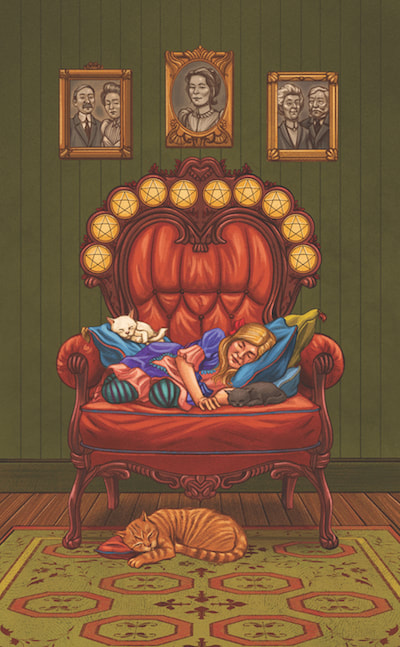

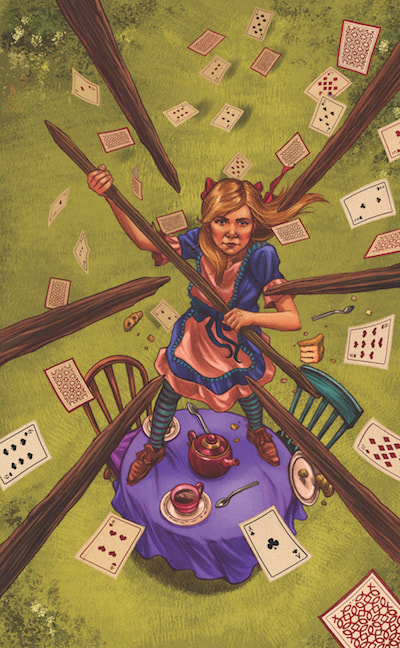
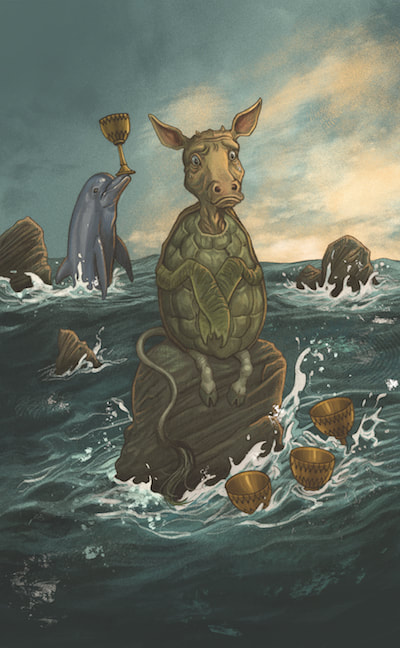
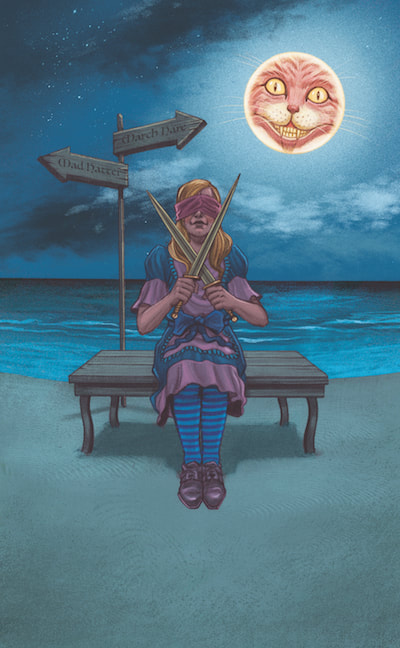
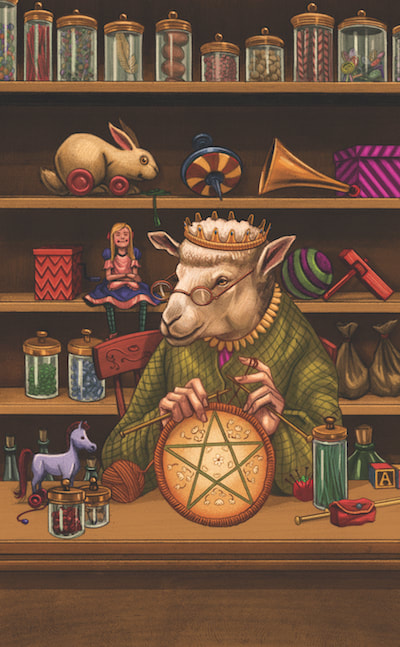
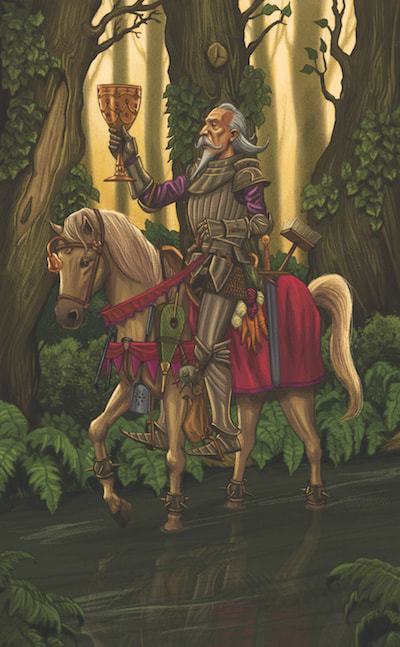
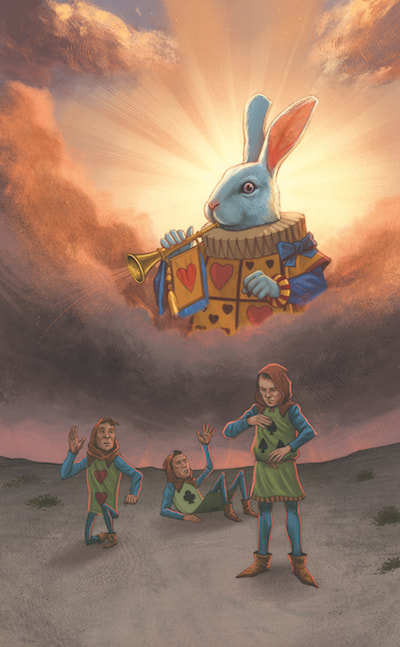
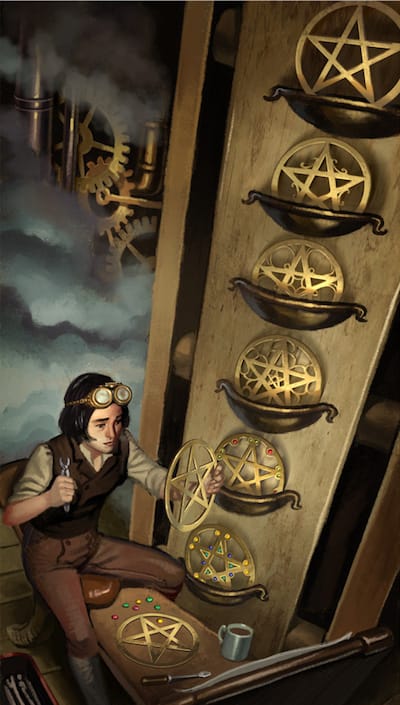
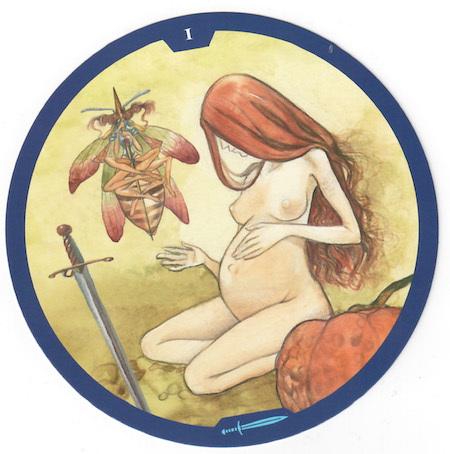
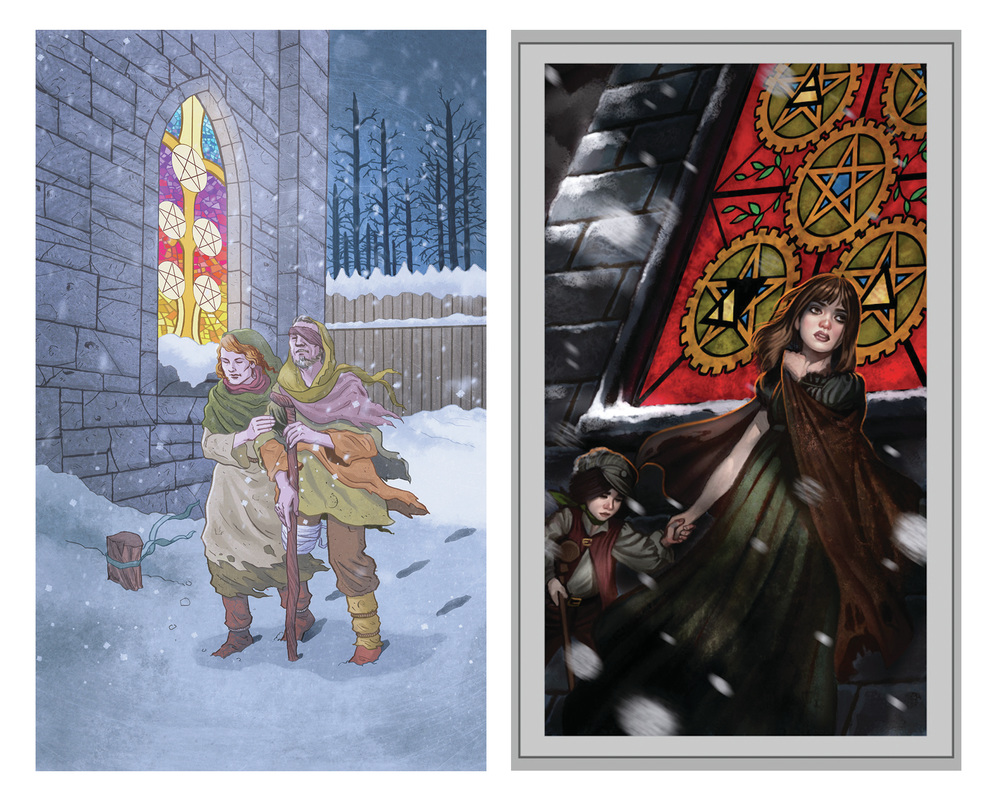
 RSS Feed
RSS Feed